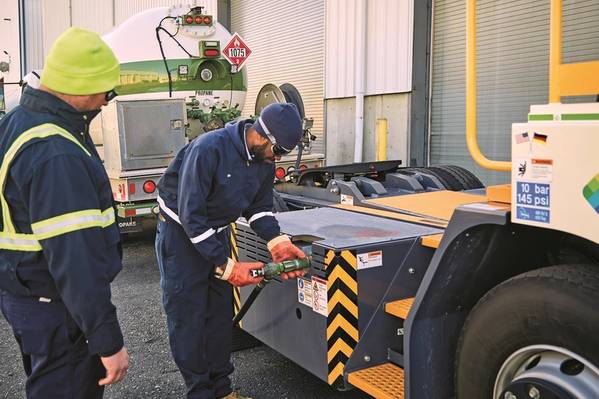
Renewable propane is aiding decarbonization efforts in port terminals
The push for clean, reliable energy sources in the supply chain continues to drive fleet managers and port authorities toward low-emissions energy options such as renewables. Not all renewable energy sources are equal, leaving many questions unanswered. Fortunately, renewable propane offers the same benefits as conventional propane — reliability, portability, and power — with the added benefit of a low carbon score and overall reduced emissions.
Renewable propane is made from a variety of feedstocks, including camelina plant oil, vegetable oil, animal fats, used cooking oil, soybean oil and animal tallow. At the point of combustion, the carbon intensity score of renewable propane is four times lower than conventional propane and five times lower than diesel. Coupled with being affordable and efficient, renewable propane is helping ports meet environmental goals now.
Mobile power generation
Propane-powered towable power generation units can be used in port settings for a variety of applications. Capable of charging electric medium-size vehicles, forklifts and yard tractors, mobile generators allow users to take the power where it’s needed without costly infrastructure updates.
Trailer-mounted units are typically more powerful than smaller, portable units, with options ranging from 90 to 400 kW of power. Fuel capacity on-board varies by model, but most towable units can hold between 64 and 3,500 U.S. gallons of propane on-board. Additional propane tanks can be delivered and installed on-site to further extend resiliency and reliable power.
Propane-powered mobile generators also ensure resiliency in ports because unlike diesel, it does not degrade over time and is always ready at a moment’s notice. These mobile units can be used beyond electric applications and provide power to other essential facilities during electric grid failures.
Port-side power
Along with mobile power units, controlled power grids, also known as microgrids, can ensure port operations continue. Microgrids operate autonomously, disconnecting from the larger electric grid if and when the primary grid goes down.
Microgrids today are powered by a combination of distributed energy sources — solar panels, wind turbines, combined heat and power, and generators. By collecting and storing electricity from solar panels and wind turbines, the microgrid only uses its propane generator as needed, making it incredibly efficient and environmentally friendly.
Not only can microgrids supply enough power for a port’s electricity demands, microgrids are an environmentally friendly solution for shore power. To keep the dangerous, toxic fumes from vessels and generators to a minimum, propane generators are a solution proven to be 98% cleaner than diesel-fueled equivalents.
Microgrids that utilize propane as an energy source get even cleaner when renewable propane is considered. Because renewable propane’s chemical structure and physical properties are the same as traditional propane, renewable propane can be used for all the same applications, as well as in innovative blends.
The rising demand for renewable liquid fuels is driving the production of renewable propane. According to data from the U.S. Environmental Protection Agency, 4.6 million gallons of renewable propane were produced in 2021. However, within the next few years, 100 million gallons of renewable propane will likely be available with a total potential of 300 million gallons in the next decade. In fact, by 2050, renewable propane could meet half the world’s demand for non-chemical propane, according to the World Liquid Gas Association.
Port authorities are encouraged to continue integrating clean propane-powered solutions. As renewable propane becomes more accessible, the infrastructure will already be in place and able to significantly reduce carbon emissions.



